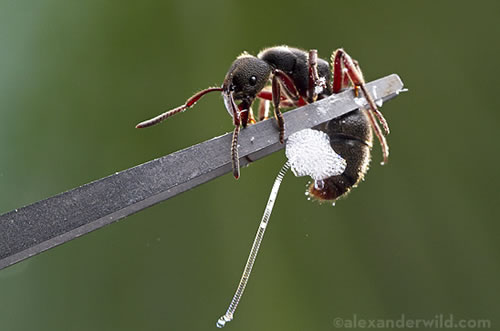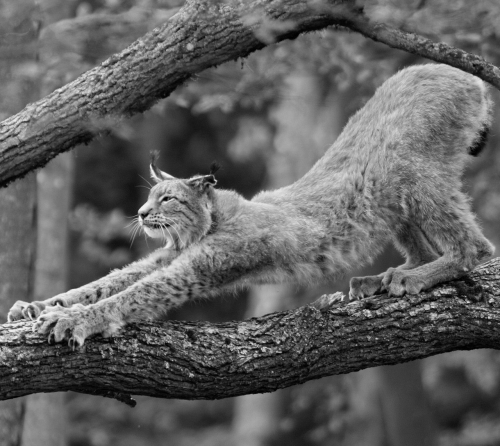Study suggests the mammals adjust to diminish the din of engines, sonar and more
By William J. Broad
Perhaps we can save the whales – or at least their hearing.
Scientists have long known that man-made, underwater noises –
from engines, sonars, weapons testing, and such industrial tools as air
guns used in oil and gas exploration – are deafening whales and other
sea mammals. The Navy estimates that loud booms from just its underwater
listening devices, mainly sonar, result in temporary or permanent
hearing loss for more than a quarter-million sea creatures every year, a
number that is rising.
Now, scientists have discovered that whales can decrease the
sensitivity of their hearing to protect their ears from loud noise.
Humans tend to do this with index fingers; scientists haven’t pinpointed
how whales do it, but they have seen the first evidence of the
behavior.
“It’s equivalent to plugging your ears when a jet flies over,”
said Paul E. Nachtigall, a marine biologist at the University of Hawaii
who led the discovery team. “It’s like a volume control.”
The finding, while preliminary, is already raising hopes for the
development of warning signals that would alert whales, dolphins and
other sea mammals to auditory danger.
Peter Madsen, a professor of marine biology at Aarhus University
in Denmark, said he applauded the Hawaiian team for its “elegant study”
and the promise of innovative ways of “getting at some of the noise
problems.” But he cautioned against letting the discovery slow global
efforts to reduce the oceanic roar, which would aid the beleaguered sea
mammals more directly.
The noise threat arises because of the basic properties of
seawater. Typically, light can travel for hundreds of feet through ocean
water before diminishing to nothingness. But sound can travel for
hundreds of miles.
The world’s oceans have been getting noisier as companies and
governments expand their undersea activities. Researchers have linked
the growing racket to deafness, tissue damage, mass strandings and
disorientation in creatures that rely on hearing to navigate, find food
and care for their young.
The danger has long been a political football. In 2008, the
Supreme Court heard a lawsuit by the National Resources Defense Council
against the Navy over ocean noise; the court ruled that naval vessels
had the right to test sonar systems for hunting submarines. But
environmentalists saw a tacit victory in getting the nation’s highest
court even to consider the health of sea mammals in a debate over
national security.
The latest development took place at a research facility off Oahu
– at an island where the opening shots of “Gilligan’s Island” were
filmed.
How sea mammals hear
Scientists there are studying how dolphins and toothed whales
hear. In nature, the mammals emit sounds and listen for returning echoes
in a sensory behavior known as echolocation. In captivity, scientists
taught the creatures to wear suction-cup electrodes, which revealed the
patterns of brainwaves involved in hearing.
The discovery came in steps. First, Nachtigall and his team found
that the animals could adjust their hearing in response to their own
loud sounds of echolocation, mainly sharp clicks. The scientists then
wondered if they could also protect their ears from incoming blasts.
The team focused on a false killer whale named Kina and sought to
teach her a conditioned behavior similar to how Pavlov taught dogs to
salivate upon hearing a bell.
First, the scientists played a gentle tone repeatedly. Then they
followed the gentle pulse with a loud sound. After a few trials, the
warning signal alone caused Kina to decrease the sensitivity of her
hearing.
“It shows promise as a way to mitigate the effects of loud
sounds,” said Nachtigall, founding director of the Marine Mammal
Research Program at the University of Hawaii. “People are generally very
excited about it.”
In May, Nachtigall and his colleagues presented the findings to
acoustic scientists and groups meeting in Hong Kong, including the
Acoustical Society of America. The team cited the protective deafening
as a potential way to help sea mammals cope with noisy blasts from naval
sonars, civilian air guns and other equipment.
In the future, the team plans to expand the research to other species in captivity and ultimately to animals in the wild.
“We have a problem in the world,” Nachtigall said of the oceanic
roar. “And we think the animals can learn this response very rapidly.”
Scientists unconnected to the mammal research called it important.
A rare ability
“It’s a big deal,” said Vincent M. Janik, a prominent marine
biologist at the University of St. Andrews in Scotland. In an email, he
said it revealed a rare ability among the planet’s creatures.
Carl Safina, president of the Blue Ocean Institute, a
conservation group in Cold Spring Harbor, N.Y., called the discovery a
potential window into what sea mammals may already do on some occasions
to protect their hearing.
“I’ve sometimes wondered why these high intensity sounds don’t
cause problems all the time,” he said in an interview. “Maybe it’s that,
once the animals hear something very loud, they can adjust their
hearing – dial it down and protect themselves.”
Scientists say the extraordinary hearing of sea mammals evolved
to compensate for poor visibility beneath the waves and to take
advantage of the unique qualities of seawater. Sound travels five times
faster than in air and undergoes far less diminishment.
The heads of whales and dolphins are mazes of resonant chambers
and acoustic lenses that give the animals not only extraordinary hearing
but complex voices. The distinctive songs of humpback whales appear to
be sung exclusively by males seeking mates.
In recent decades, scientists have linked the human cacophony to
reductions in mammalian vocalization, which suggests declines in
foraging and breeding. And the problem is poised to get worse: In May,
the Navy disclosed draft environmental impact statements (Atlantic and
Pacific operations) that said planned expansions could raise the annual
hearing losses among sea mammals to more than 1 million.
Zak Smith, a lawyer with the Natural Resources Defense Council, recently called the new estimates “staggering.”
A question of science, Nachtigall said, is whether the levels of
protective deafening found in Kina can be increased. The team plans to
study the auditory response in such species as bottlenose dolphins and
beluga whales before trying it on wild populations.
The big political hurdle is financing, he said. Federal support
for the sea mammal research has declined in recent years, and industry
is only starting to show interest in the finding.
“I’m pulling in money where I can,” he remarked. Nachtigall said
the research was costly because sea mammals need high levels of care.
But he called it revealing and rewarding. “When it comes to
whales and sound,” Nachtigall said, “we’re just starting to understand.”





 Dear Readers,
Dear Readers,



 Meet
the Baining, an indigenous tribe in Papua New Guinea who has the unusual
claim of being the most boring people on Earth:
Meet
the Baining, an indigenous tribe in Papua New Guinea who has the unusual
claim of being the most boring people on Earth:
 If
the next time you eat an ice cream you notice that it's yummier, you have
a computer to thank. A supercomputer, actually.
If
the next time you eat an ice cream you notice that it's yummier, you have
a computer to thank. A supercomputer, actually.


 The
hottest thing in London is the Olympic Flame. And what about the 8,000
torches that each sport 8,000 holes that 8,000 people carried 8,000
miles? What happens to those now that the cauldron has been lit? Olympic
torches have always been highly collectible, but the 2012 torches are
extremely coveted.
The
hottest thing in London is the Olympic Flame. And what about the 8,000
torches that each sport 8,000 holes that 8,000 people carried 8,000
miles? What happens to those now that the cauldron has been lit? Olympic
torches have always been highly collectible, but the 2012 torches are
extremely coveted.









